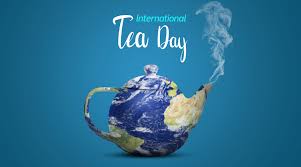International Tea Day
By Sharon Schweitzer
Tea is a beverage made from the Camellia sinesis plant. Tea is the world’s most consumed drink, after water. It is believed that tea originated in northeast India, north Myanmar and southwest China, but the exact place where the plant first grew is not known. There is evidence that tea was first discovered over 4000 years ago in China by Emperor Nun Shen. According to legend, tea was discovered in 2737 BCE when a few leaves from a nearby tree fell into a pot of boiling water. Intrigued by the aroma and flavor of the resulting beverage, he began to investigate the properties of the tea plant and its medicinal benefits.
Started by trade unions in 2005, International Tea Day celebrates the health benefits, economic importance, and cultural heritage of tea, all the while ensuring a more sustainable production from fields to our cups. Bringing together civil society organizations and small tea growers and businesses, this holiday aims to regulate uneven competition, safety regulations, land occupation, social security, living wages, and women’s rights for all tea workers. It also has cultural significance in many societies.
Over time, tea became an integral part of Chinese culture, with tea ceremonies and rituals evolving to celebrate this beloved beverage. From China, tea spread to other parts of Asia and eventually to Europe, where it became a luxury item prized for its taste and health benefits.
The tea plant is usually grown in warm tropical and subtropical climates in over 35 countries, the cultivation of tea supports the livelihoods of over 13 million people.
According to the latest data from the Food and Agriculture Organization (FAO), more than 6.5 million tonnes of tea was produced worldwide in 2021. The Far East was responsible for producing 80 percent (5.3 tonnes) of all the world’s tea.
China produces nearly half of the world’s tea (47 percent), with some 3 billion tonnes produced in 2021. India is the second highest tea producer, accounting for 20 percent (1.35 million tonnes) of the world’s tea, followed by Kenya with more than 8 percent of global production.
Sri Lanka, Turkey, Vietnam, Indonesia, Bangladesh and Argentina are among the top 10 tea-producing countries around the world.
One type of tea that has gained worldwide popularity is chai, a spiced tea that originated in India. Chai is a Hindi word that means “tea,” and it is typically made by brewing black tea with a blend of spices, such as cinnamon, cardamom, ginger, and cloves.
Chai has a long and storied history in India, where it has been consumed for centuries as a traditional beverage. In fact, chai is often considered the national drink of India, and it is a staple in many Indian households.
Chai became popular in the West in the 1990s, with the rise of coffeehouse culture and the introduction of chai lattes. Today, chai is enjoyed around the world, with many variations and adaptations to suit different tastes and preferences.
Photo by www.healthkart.com
Sharon Schweitzer JD, is a diversity and inclusion consultant, cross-cultural trainer, etiquette expert, and the founder of Access to Culture. In addition to her accreditation in intercultural management from the HOFSTEDE Centre, she is an attorney and mediator. Sharon served as a Chinese Ceremonial Dining Etiquette Specialist in the documentary series Confucius was a Foodie, on Nat Geo People. Her Amazon #1 Best Selling book in International Business, Access to Asia: Your Multicultural Business Guide, won a coveted Kirkus Star, and was named to Kirkus Reviews’ Best Books. She’s a winner of numerous awards, including the British Airways International Trade Award at the Greater Austin Business Awards.
#SharonSchweitzer, #AccesstoCulture, Access2Culture, #InternationalCelebration, #AccesstoAsia, #GlobalEtiquette, #Cross-CulturalTrainer, #InterculturalCommunication, #InternationalCommunication, #Interculturalist, #Etiquette, #CultureExpert, #Speaker, #KeynoteSpeaker, #AsianCulture, #CulturalIntelligence, #tea, #chai, #India, #Myanmar, #SriLanka, #Turkey, #Vietnam, #Indonesia, #Bangladesh, #Argentina


Leave A Comment